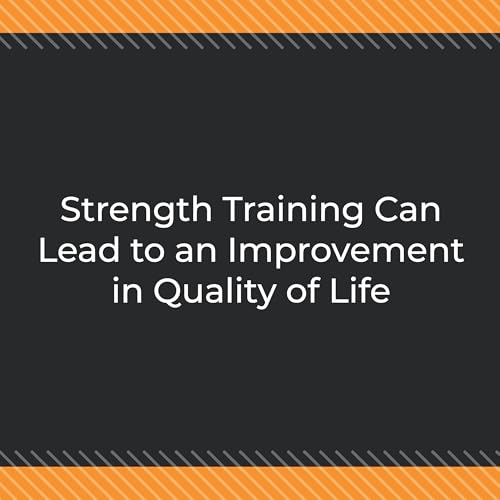
Strength Training Can Lead to an Improvement in Quality of Life
Failed to add items
Add to basket failed.
Add to Wish List failed.
Remove from Wish List failed.
Follow podcast failed
Unfollow podcast failed
-
Narrated by:
-
By:
About this listen
If you had to put a number on your happiness, energy, and overall well-being—what score would you give your life right now?
In this episode, Amy Hudson and Dr. James Fisher dig into the science of quality of life—how researchers actually measure it, and why it’s about so much more than health stats or fitness levels. They reveal why building physical strength often leads to emotional freedom and how strength training improves mental health, social connection, and vitality.
Tune in to learn how training your body can completely reshape the way you feel about your life.
- Amy shares her definition of quality of life. She looks beyond just physical health and considers energy, mood, and daily worries. The big question is: Am I happy—and could I be happier?
- Dr. Fisher explains how quality of life is measured. He breaks it down with short-form surveys like the SF-12 and SF-36 that ask people to rate their health on a simple scale from excellent to poor. The point is not the specific symptom—but your overall sense of well-being.
- Understand the broader meaning of quality of life. Dr. Fisher reveals it’s not only about physical health or ability to work—it’s also about mood, social connection, and everyday experiences.
- Dr. Fisher shares: “How often during the past month have you felt so down in the dumps that nothing could cheer you up?” It’s a reminder that emotional health is central to quality of life.
- Amy and Dr. Fisher discuss how resistance training impacts your quality of life.
- A 2019 systematic review of 16 studies showed that strength training consistently improved health-related quality of life in older adults. The benefits weren’t just physical metrics like cholesterol—they were about how people felt.
- Learn how resistance training changes perception. Participants filled out quality-of-life surveys before and after strength training interventions, and the results showed mental health, energy, and outlook improving.
- Dr. Fisher reveals how training affects mental and social well-being. Resistance training boosted emotional control, mental health, social function, and vitality scores.
- According to Amy, people who engage in strength training don’t just get stronger—they become more energized, more social, and more alive.
- Understand the concept of emotional role function.
- Amy and Dr. Fisher unpack how it reflects control over emotions and the ability to bounce back when life feels tough. Strength training plays a role in building this resilience.
- Dr. Fisher shares his personal perspective. When he strength trains, it’s a way to release stress, burn off anger, and reset emotionally. It’s not just exercise—it’s therapy for the mind.
- Amy explains how we experience the world depends on both our emotional and physical states. Strength training is a tool that improves both—leading to a richer, more positive quality of life.
- Amy and Dr. Fisher agree that resistance training can help us regulate emotions and reclaim a sense of freedom.
- While we can’t control everything that happens to us, we can control how we respond.
Mentioned in This Episode:
The Exercise Coach - Get 2 Free Sessions!
Submit your questions at StrengthChangesEverything.com
This podcast and blog are provided to you for entertainment and informational purposes only. By accessing either, you agree that neither constitute medical advice nor should they be substituted for professional medical advice or care. Use of this podcast or blog to treat any medical condition is strictly prohibited. Consult your physician for any medical condition you may be having. In no event will any podcast or blog hosts, guests, or contributors, Exercise Coach USA, LLC, Gymbot LLC, any subsidiaries or affiliates of same, or any of their respective directors, officers, employees, or agents, be responsible for any injury, loss, or damage to you or others due to any podcast or blog content.


